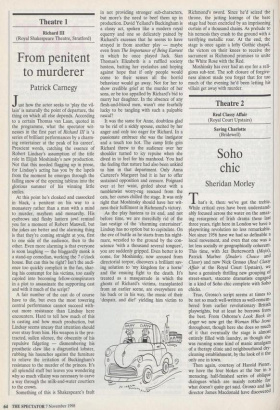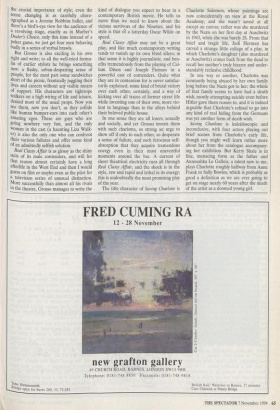Theatre 2
Real Classy Affair (Royal Court Upstairs) Saving Charlotte (Bridewell)
Soho chic
Sheridan Morley
That's it, then: we've got the treble. While critical eyes have been understand- ably focused across the water on the amaz- ing resurgence of Irish drama these last three years, right here in London we have a playwriting revolution no less remarkable. Not since 1956 have we had so definable a local movement, and even that one was a lot less socially or geographically coherent. This time, with Jez Butterworth (Mojo), Patrick Marber (Dealer's Choice and Closer) and now Nick Grosso (Real Classy Affair at the Royal Court Upstairs), we have a genuinely thrilling new grouping of street-smart, staccato dramatists engaged in a kind of Soho chic complete with Soho chicks.
True, Grosso's script seems at times to be not so much well-written as well-remem- bered from earlier revolutionary British playwrights, but at least he borrows from the best. From Osborne's Look Back in Anger we now get the Woman Who Irons throughout, though here she does so much of it that eventually the stage is almost entirely filled with laundry, as though she was running some kind of manic amalgam of a therapy clinic and neighbourhood dry- cleaning establishment, by the look of it the only one in town. Then again, courtesy of Harold Pinter, we have the four blokes at the bar in a menacing, half-finished series of oblique dialogues which are mainly notable for what doesn't quite get said. Grosso and his director James Macdonald have discovered the crucial importance of style; even the scene changing is as carefully chore- ographed as a Jerome Robbins ballet, and there's a bird's-eye view for the audience of a revolving stage, exactly as in Marber's Dealer's Choice, only this time instead of a poker game, we just get four men behaving badly in a series of verbal brawls.
But Grosso is also exciting in his own right and write; to all the well-tried formu- las of earlier stylists he brings something new: a flashy, urban-despairing sense of people, for the most part some sandwiches short of the picnic, frantically juggling their lives and careers without any visible means of support. His characters are tightrope walkers on a high wiring of life and leisure, denied most of the usual props. Now you see them, now you don't, as they collide like human bumper-cars into each other's amazing egos. These are guys who are going nowhere very fast, and the only woman in the cast (a haunting Liza Walk- er) is also the only one who can confront their various failures and offer some kind of an admittedly selfish solution. Real Classy Affair is as glossy as the shiny suits of its male contenders, and will for that reason almost certainly have a long afterlife in the West End and then I would guess on film or maybe even as the pilot for a television series of unusual distinction. More successfully than almost all his rivals in the theatre, Grosso manages to write the kind of dialogue you expect to hear in a contemporary British movie. He tells us more than we need to know about the vicious survivors of the Nineties, and his style is that Of a latterday Oscar Wilde on speed.
Real Classy Affair may not be a great play, and like much contemporary writing tends to vanish up its own blind alleys; in that sense it is highly journalistic, and ben- efits tremendously from the playing of Cal- lum Dixon and Joseph Fiennes in a powerful cast of contenders. Quite what they are in contention for is never satisfac- torily explained; some kind of brutal victory over each other, certainly, and a way of kicking over all traces of former street life while inventing one of their own, more vio- lent in language than in the alleys behind their beloved public house.
In one sense they are all losers, sexually and socially, and yet Grosso invests them with such charisma, so strong an urge to show off if only to each other, so desperate a sense of failure, and such ferocious self- absorption that they acquire tremendous energy even in their most uneventful moments around the bar. A current of sheer theatrical electricity runs all through Real Classy Affair, and the shock is in the style, raw and rapid and lethal in its energy; this is undoubtedly the most promising play of the year.
The title character of Saving Charlotte is Charlotte Salomon, whose paintings are now coincidentally on view at the Royal Academy, and she wasn't saved at all except on canvas; rather was she murdered by the Nazis on her first day at Auschwitz in 1943, when she was barely 26. From that brief and tragic life, Judi Herman has carved a strange little collage of a play, in which Charlotte's daughter (also murdered at Auschwitz) comes back from the dead to recall her mother's truly bizarre and under- standably reclusive childhood.
In one way or another, Charlotte was constantly being abused by her own family long before the Nazis got to her; the whole of that family seems to have had a death wish, mostly attempting suicide even before Hitler gave them reason to, and it is indeed arguable that Charlotte's refusal to go into any kind of real hiding from the Germans was yet another form of death wish.
Saving Charlotte is kaleidoscopic and inconclusive, with four actors playing out brief scenes from Charlotte's early life, though you might well learn rather more about her from the catalogue accompany- ing her exhibition. But Kerry Shale is in fine, menacing form as the father and Annoushka Le Gallois, a talent new to me, plays Charlotte roughly halfway from Anne Frank to Sally Bowles, which is probably as good a definition as we are ever going to get on stage nearly 60 years after the death of the artist as a doomed young girl.



















































































 Previous page
Previous page